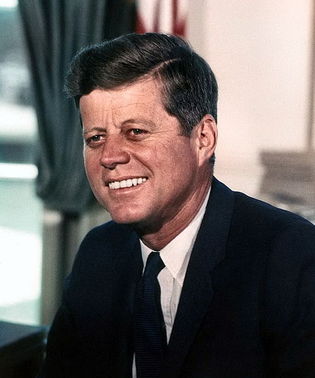
For something a bit more relevant, study the proclamation President John F. Kennedy signed that year for Thanksgiving — a day he never lived to see.
It’s relevant only because in recent days Wal-Mart, the world’s king of retail, announced it plans to begin its black-Friday Christmas sales this year at 6 p.m. on Thanksgiving.
This is the latest one-up in the relentless encroachment on what was, from the start, a purely religious holiday.
| | Thanksgiving’s weakness to resist this surge is that its only commercial aspect involves the purchase of food. Other than perhaps a new electric carving knife, it has no shiny objects or toys to offer. Its message is deeper and quieter than that, and deep, quiet things tend to get drowned out in a season whose commercial aspect is seen as vital to the economy. Writing recently in The Guardian, American journalist Heather Long wondered what might happen in the future when “an immigrant or foreigner asks an American what Thanksgiving is all about…” Her concern is that “the answer will be shopping, not family, food and gratitude.” Which is why it might be helpful to read JFK’s proclamation. Of course, each president issues a proclamation this time of year, which seldom makes even a ripple on the news cycle. And they haven’t changed much through the years, remaining one of the few instances when modern presidents make openly religious statements. Obama’s 2012 proclamation mentioned “the God-given bounty that enriches our lives,” and urged people to “spend this day by lifting up those we love, mindful of the grace bestowed upon us by God and by all who have made our lives richer with their presence.” Kennedy’s proclamation, made poignant by his subsequent death, urged people to “gather in sanctuaries dedicated to worship and in homes blessed by family affection to express our gratitude for the glorious gifts of God; and let us earnestly and humbly pray that He will continue to guide and sustain us in the great unfinished tasks of achieving peace, justice, and understanding among all men and nations and of ending misery and suffering wherever they exist.” The proclamations, whether from a man cut down tragically 50 years ago or the current president, are reminders that, officially, at least, the nation continues to acknowledge the value of setting aside a day to thank God for blessings. As I wrote several years ago, gratitude not only is a tonic for self-pity, a false sense of entitlement and a host of other ills, it helps the nation keep a proper sense of perspective. That perspective contrasts sharply with black Friday, a day that comes cloaked in the sheep’s wool of a giving spirit, but that often reveals a hidden ravenous reality. As an example, one study found 8 in 10 shoppers that day intend to buy for themselves. It’s almost easier these days to list the big retailers that won’t be open on Thanksgiving Day. For the record, Costco remains the most prominent holdout, with a vice president of that company telling the Huffington Post “…we simply believe that they (store employees) deserve the opportunity to spend Thanksgiving with their families." It will be interesting to see how long that generous spirit can withstand the tide of profits. Don’t get me wrong. I am a strong proponent of the free market. I also recognize that retailers wouldn’t encroach on Thanksgiving if they felt the public relations fallout would ruin them. But that’s the problem. A gulf is growing between our presidential proclamations and our actions on Thanksgiving. Kennedy wanted us to give thanks “for the ideals of honor and faith we inherit from our forefathers…” Shouldn’t we be willing to set aside at least 24 hours for that, give or take a few hours for football. |

 RSS Feed
RSS Feed

